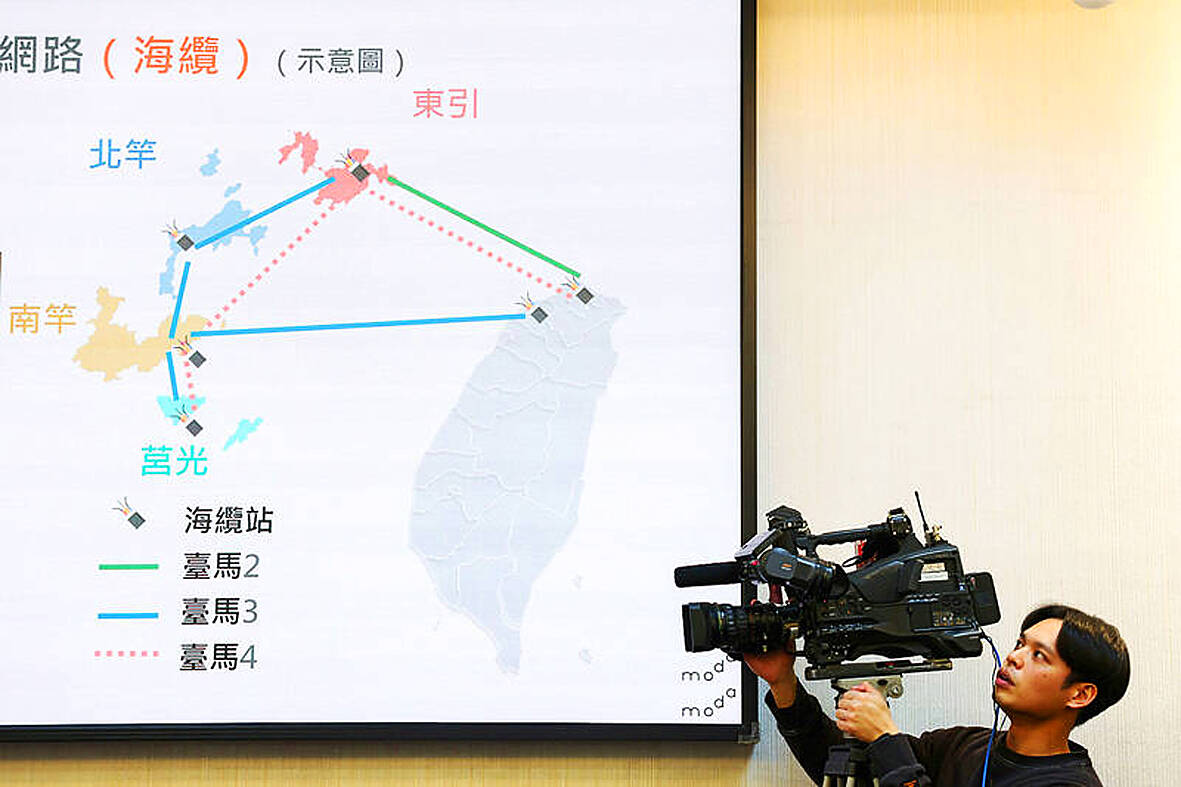Repairs on the No. 2 submarine telecommunication cable between Taiwan and Lienchiang County (Matsu) have been completed, restoring dual-cable transmission after two cables failed, Chunghwa Telecom Co said in a statement on Friday.
The restoration of the No. 2 cable “ensures more stable telecommunications services for Matsu, with microwave transmission serving as a full-bandwidth backup,” said Chunghwa Telecom, which operates the cables.
Problems have plagued the No. 2 and No. 3 fiber-optic undersea cables between Taiwan proper and the outlying county since late last year.

Photo: Ann Wang, Reuters
The Ministry of Digital Affairs has attributed the damage to the cables to “natural deterioration.”
The No. 2 cable sustained partial core fiber breaks on Sept. 22 last year and Jan. 22, Chunghwa Telecom said in the statement.
On Feb. 16, the cable suffered a complete break approximately 30km off New Taipei City’s Tamsui District (淡水), it said.
The No. 3 cable was obstructed on Jan. 15, Chunghwa Telecom said at the time.
Communications between Taiwan proper and Lienchiang County was automatically rerouted through a full-bandwidth microwave backup system to ensure uninterrupted service, the company said, adding that it also coordinated with an international submarine cable maintenance organization to dispatch a repair vessel to Taiwan.
After completing repairs to the No. 3 cable on March 2, the repair vessel sailed to waters off Tamsui and off Lienchiang County’s Dongyin Island (東引) to fix the No. 2 cable, it said.
As of Friday morning, repairs at the Tamsui and Dongyin ends of the cables had been completed, restoring dual-cable communications between Taiwan proper and Lienchiang County, the company said.

A strong continental cold air mass is to bring pollutants to Taiwan from tomorrow, the Ministry of Environment said today, as it issued an “orange” air quality alert for most of the country. All of Taiwan except for Hualien and Taitung counties is to be under an “orange” air quality alert tomorrow, indicating air quality that is unhealthy for sensitive groups. In China, areas from Shandong to Shanghai have been enveloped in haze since Saturday, the ministry said in a news release. Yesterday, hourly concentrations of PM2.5 in these areas ranged from 65 to 160 micrograms per cubic meter (mg/m³), and pollutants were

Taiwan’s armed forces have established response protocols for a wide range of sudden contingencies, including the “Wan Chun Plan” to protect the head of state, the Ministry of Defense (MND) said today. After US President Donald Trump on Saturday launched a series of airstrikes in Venezuela and kidnapped Venezuelan President Nicolas Maduro, concerns have been raised as to whether China would launch a similar “decapitation strike” on Taiwan. The armed forces regularly coordinate with relevant agencies and practice drills to ensure preparedness for a wide range of scenarios, Vice Minister of National Defense Hsu Szu-chien (徐斯儉) told reporters before a

EVA Airways on Saturday said that it had suspended a pilot and opened an investigation after he allegedly lost his temper and punched the first officer several times as their plane was taxiing before takeoff at Los Angeles International Airport. According to a report published on Thursday by The Reporter, the incident occurred after the flight’s Malaysian first officer tried to warn the Taiwanese pilot, surnamed Wen (文), that he was taxiing faster than the speed limit of 30 knots (55.6kph). After alerting the pilot several times without response, the first officer manually applied the brakes in accordance with standard operating

NOT AN OPENING: Trump’s violation of international law does not affect China’s consideration in attacking Taiwan; Beijing lacks capability, not precedent, an official said Taiwanese officials see the US’ capture of the president of Venezuela as a powerful deterrent to Beijing’s aggression and a timely reminder of the US’ ability to defeat militaries equipped with Chinese-made weapons. The strikes that toppled Venezuelan President Nicolas Maduro signaled to authoritarian leaders, including Chinese President Xi Jinping (習近平), US President Donald Trump’s willingness to use military might for international affairs core to US interests, one senior official in Taipei’s security circle said. That reassured Taiwan, the person said. Taipei has also dismissed the idea that Trump’s apparent violation of international law could embolden Beijing, said the official, who was not